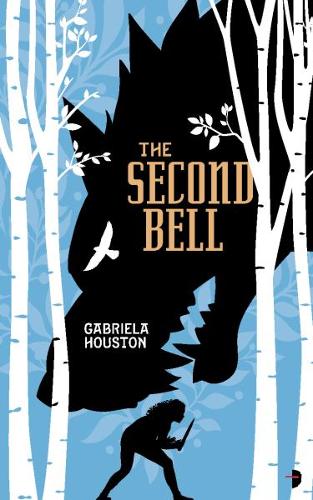
TITLE: The Second Bell
AUTHOR: Gabriela Houston
PUBLISHER: Angry Robot Books
ISBN: 9780857668905
PODCAST EPISODE: Forthcoming
REVIEWER: Mark Norman
The Second Bell is a Young Adult Fantasy debut novel from new author Gabriela Houston, and a very good debut it is too.
As an adult reader, I'm often jealous of teenage readers. Their books often have far more entertaining and enjoyable plots compared to many adult titles. Maybe I'm young at heart - cynics might call me out as unsophisticated - but I don't care. I'm a fan of the Young Adult Fantasy genre because more often than not, they tell a good story, and they are designed to engage the reader.
Much like the previously featured book The Girl Who Speaks Bear by Sophie Anderson, Houston carefully and cleverly weaves real-world folklore into a fictionalised version; adapting it to work in her favour for the story that she wants to tell.
The Second Bell tells the story of Salka, born into the world as a striga - a child with two hearts who is generally considered to be a dangerous demon and therefore shunned by the community into which it is born. Salka's mother Miriat chooses to remove herself and her daughter to a remote mountain village where the striga live together to avoid the dangerous ritual often carried out to remove the 'dark' heart. The book follows Salka's efforts to fit in, to be expected to repress her dark side and to live as expected in her community. But events make this more and more difficult and Salka finds herself having to make some difficult choices.
The plot is, as you might imagine, a commentary on acceptance; on what it means to be 'other' and as such it might also be treated as a reading on so many aspects of our shared histories, as well as too many communities still facing similar struggles now. But, far from being sentimental or preachy, it shows the implications of the choices which might be made in a community, reflecting them from the perspective of the traditional and superstitious beliefs which make up the folkloric elements within it. It draws on aspects of Eastern European belief, reworking them into a fictional framework but never to the detriment of the original folklore.
Part fairy tale, part social commentary and fully engaging, The Second Bell is a recommended read for a bit of escapism with more than a dash of folklore, whatever your age.
AUTHOR: Gabriela Houston
PUBLISHER: Angry Robot Books
ISBN: 9780857668905
PODCAST EPISODE: Forthcoming
REVIEWER: Mark Norman
The Second Bell is a Young Adult Fantasy debut novel from new author Gabriela Houston, and a very good debut it is too.
As an adult reader, I'm often jealous of teenage readers. Their books often have far more entertaining and enjoyable plots compared to many adult titles. Maybe I'm young at heart - cynics might call me out as unsophisticated - but I don't care. I'm a fan of the Young Adult Fantasy genre because more often than not, they tell a good story, and they are designed to engage the reader.
Much like the previously featured book The Girl Who Speaks Bear by Sophie Anderson, Houston carefully and cleverly weaves real-world folklore into a fictionalised version; adapting it to work in her favour for the story that she wants to tell.
The Second Bell tells the story of Salka, born into the world as a striga - a child with two hearts who is generally considered to be a dangerous demon and therefore shunned by the community into which it is born. Salka's mother Miriat chooses to remove herself and her daughter to a remote mountain village where the striga live together to avoid the dangerous ritual often carried out to remove the 'dark' heart. The book follows Salka's efforts to fit in, to be expected to repress her dark side and to live as expected in her community. But events make this more and more difficult and Salka finds herself having to make some difficult choices.
The plot is, as you might imagine, a commentary on acceptance; on what it means to be 'other' and as such it might also be treated as a reading on so many aspects of our shared histories, as well as too many communities still facing similar struggles now. But, far from being sentimental or preachy, it shows the implications of the choices which might be made in a community, reflecting them from the perspective of the traditional and superstitious beliefs which make up the folkloric elements within it. It draws on aspects of Eastern European belief, reworking them into a fictional framework but never to the detriment of the original folklore.
Part fairy tale, part social commentary and fully engaging, The Second Bell is a recommended read for a bit of escapism with more than a dash of folklore, whatever your age.